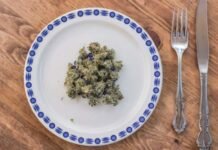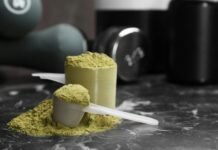
Gandoderma lucidum is an edible medicinal mushroom native to Asia. It has been used therapeutically for at least 2,000 years, going by the name “reishi” in Japan and “lingzhi” in China.
Thriving in hot and humid environments, reishi is characterized by its reddish, glossy, kidney-shaped cap on a stout stem. Growing in clusters on the stumps of deciduous trees, reishi can also sometimes form elongated stems or long, antler-like bodies without a cap, depending on carbon dioxide levels in the immediate area.
Wild reishi was once rare, expensive, and used only by the ancient nobility. In nature, it may appear on only two to three out of 10,000 trees. Today, however, reishi is successfully cultivated on hardwood logs or woodchips, allowing the sacred mushroom to be conveyed to a much wider audience.
6 Proven Health Benefits Of Reishi Mushrooms
1. Reishi Mushrooms are Rich in Bioactive Compounds
Like many other types of mushrooms, reishi is made up of around 90% water with the remaining 10% composed of protein, fat, fiber, carbohydrates, and ash.
Its major bioactive components are polysaccharides, peptidoglycans, and triterpenes, which are believed to give the mushroom its healing properties. These constituents have demonstrated anti-inflammatory, hypoglycemic, immunity-boosting, and anti-tumor effects.
Reishi mushrooms are also low in calories and provide minerals like phosphorus, potassium, calcium, magnesium, sulfur, and silica; and lesser amounts of iron, zinc, copper, and manganese. When exposed to sunlight, mushrooms are among the few food sources that supply vitamin D.
Compared with 13 other edible mushroom varieties, reishi exhibits robust antioxidant properties. With an average free scavenging activity of 30.1%, reishi mushrooms led the pack in antioxidant potential in comparison with lion’s mane (17.7%), shiitake (15.9%), and enoki (12%).
2. Reishi Mushrooms Boost Immunity
In ancient Chinese texts, reishi mushrooms are described as enhancing vital energy and increasing longevity. While more human trials are needed, preliminary studies on reishi mushrooms have shown that it is their polysaccharides content that helps to stimulate the immune system.
A review of in vitro and in vivo studies found that reishi mushrooms have an extensive immuno-modulating effect. They help promote the function of antigen-presenting cells, a type of immune cell that mediates the immune response. They enhance the mononuclear phagocyte system, which is responsible for the formation of new white blood cells that protect against illness. It boosts humoral immunity, an immune response that produces and secretes antibodies for specific toxins.
Other investigations into the polysaccharides in reishi mushrooms have found that they have a beneficial impact on both healthy and sick individuals. In one, it significantly improved the immune function of people with advanced-stage cancer. In another, healthy football players who consumed reishi mushrooms had an increase in white blood cells that fight infections, cancer, and other foreign invaders.
3. Reishi Mushrooms Possess Anti-Cancer Properties
The mechanism behind reishi mushroom’s ability to thwart the growth and spread of cancer cells is closely intertwined with its immune boosting activity. While it is still unclear whether the anti-cancer effect is a direct one or is mediated through the immune system, numerous studies have found that reishi has a chemopreventative and turmoricidal effect in animal and human trials.
According to a 2003 review published in Integrative Cancer Therapies, the active compounds in reishi mushrooms inhibited the growth, adhesion, and migration of various cancer cell lines including breast, prostate, lung, colon, liver, and sarcoma. It appears to accomplish this by correcting abnormal cell expression at various stages of growth and by inhibiting inflammatory enzymes like NF-?B.
Reishi mushrooms may also be a powerful tool in the treatment of cancer. In a meta-analysis of five human trials, reishi extracts used as an adjunct treatment resulted in cancer patients being 1.27 times more likely to respond to chemotherapy or radiation treatments. Those who took reishi also reported better quality of life than those who did not.
4. Reishi Mushrooms are Neuroprotective
Preliminary studies on reishi mushrooms have shown much promise as a natural way to protect the brain from neurodegenerative diseases.
In a test tube study published in 2007, reishi significantly weakened amyloid beta – peptides that are toxic to the brain and are key to the development of Alzheimer’s disease.
In another case investigating the effects of reishi mushrooms on Parkinson’s disease, researchers found it prevented the production of pro-inflammatory and toxic enzymes in vitro. It also protected dopamine neurotransmitters from cell death – a key finding since lack of dopamine in the midbrain is what causes the cardinal symptoms of Parkinson’s disease: tremors, rigidity, and slowness of movement.
5. Reishi Mushrooms Fight Fatigue & Depression
Although you likely won’t see diagnoses of neurasthenia in the Western world, it is a common condition in Asian cultures. Though it shares similarities with chronic fatigue syndrome, neurasthenia is characterized as mental and / or physical fatigue, with symptoms of dizziness, aches and pains, irritability, sleeplessness, headaches, and depressed mood.
Because reishi mushrooms are a prescribed treatment for neurasthenia in many Asian countries, researchers investigated its effects on fatigue and well being in a 2005 study. The randomized, double blind trial involved 132 patients diagnosed with neurasthenia who were given placebo or reishi mushroom extracts at 1,800 mg three times a day for 8 weeks. After receiving treatment, patients who received reishi had significantly reduced symptoms and less fatigue. By day 56 of reishi supplementation, patients’ scores for sense of well being had increased by 38.7% when compared to baseline.
6. Reishi Mushrooms Safeguard Liver Function
Though the liver is best known as the body’s detoxification system, it actually performs more than 500 vital functions. Nearly every other organ relies on the liver, and so keeping the liver healthy and working well has far reaching benefits for overall health.
Reishi mushrooms have long been used in Eastern medicine to preserve liver function. And recently, several studies have backed up these claims.
One case involves mushrooms within the genus Amanita, which are among the deadliest fungi in the world. Their lethality is due to the presence of a toxin called ?-amanitin that targets the liver, causing it to fail. Because reishi mushrooms have historically been used to treat mushroom poisoning, one study investigated its effect on patients with acute Amanita poisoning. Patients were provided with a 200 gram decoction of reishi mushrooms, along with conventional penicillin treatment, for 7 days. When compared with the control group, they had lower toxin levels in the body, which hastened the detoxification process and significantly reduced overall mortality.
Reishi mushroom’s ability to protect the liver from damage appears to stem from its antioxidant properties. Replicating the effects of ?-amanitin in the lab, researchers found that reishi counteracts the toxin’s pro-oxidant effects by effectively fighting against free radical damage.
Reishi’s heptaprotective effects were also evidenced in a 2013 animal study, where the spores of reishi mushrooms successfully protected the liver against cadmium poisoning.
Where to Get Reishi Mushrooms
While you might not see fresh reishi mushrooms on display at your local grocery store, reishi is readily available as a supplement.
We like this 8-ounce bag of organic reishi mushroom powder, with 100:1 concentration strength and polysaccharides content standardized to 30%. Just add it by the spoonful to coffee, tea, and smoothies to get your daily reishi fix.
We also really like this Four Sigmatic Reishi Mushroom Elixir which comes in twenty individual single serve packets so you can take it everywhere you go.
And of course, you can always grow your own endless supply of mushrooms at home – including reishi.



